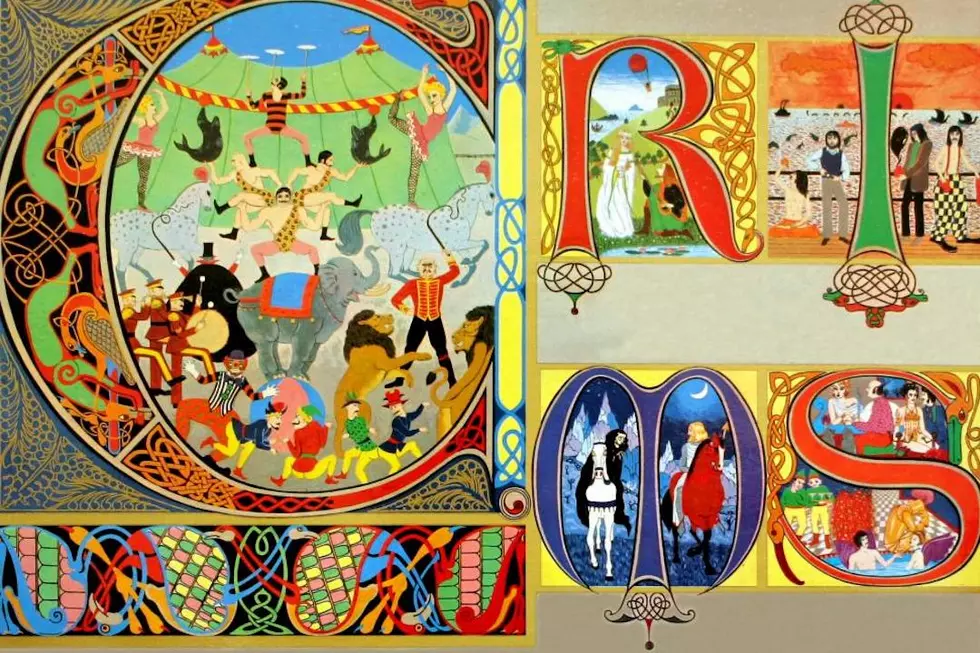
Why King Crimson’s Third Album ‘Lizard’ Was So Divisive
"Overall, the album is unlistenable," King Crimson maestro Robert Fripp once said of Lizard, the prog-rock institution's divisive third LP.
Many fans agree, and understandably so: Arriving on Dec. 10, 1970 after the band's Earth-shattering debut, 1969's In the Court of the Crimson King, and its sturdy if unsurprising 1970 sequel In the Wake of Poseidon, Lizard feels downright insane – full of dissonant grooves and free-jazz woodwind chaos, it's the photo negative of their studious early work.
But Fripp's wrong. Lizard may be an acquired taste, but buried beneath its intimidating surfaces are some of the band's most vibrant experiments.
First, the backstory. After losing singer Greg Lake to newly formed supergroup Emerson, Lake & Palmer, Fripp and lyricist Peter Sinfield rebuilt the band entirely – recruiting singer-bassist Gordon Haskell (who'd contributed vocals on Poseidon), drummer Andy McCulloch, woodwind expert Mel Collins and a slew of guests (including keyboardist Keith Tippett) to round out the transitional lineup.
The recording sessions were awkward and strained. Haskell – who'd taken the gig for financial, not creative, purposes – wasn't a fan of the band, preferring R&B to abrasive prog-rock. "I didn't like King Crimson," he told an interviewer in 1991. "Anyway, after a while I said I'd think about it, and my wife got to work on me because she wanted a regular income, so in the end I joined."
Adding to the awkwardness, the infamously hardheaded Fripp demanded new levels of instrumental firepower from his hodgepodge cast. "We got down to rehearsing Lizards [sic] and ... the drummer, Andy McCulloch, was in tears," Haskell said. "Fripp used to bully him unmercifully. He bullied us all. I don't go for that though, so where Andy would cry, I would just laugh. At the end of one song, 'Indoor Games,' I just burst out laughing. You can hear it on the album. They thought it was really freaky, that I'd understood the lyrics and my part – but the truth of the matter is, it was a lousy song, the lyrics were ludicrous and my singing was atrocious, so I just burst out laughing. And they thought it was wonderful!"
The atmosphere was frenzied, and the music mirrored that mood. "Cirkus" opens the LP with brooding jazz-folk, blending Fripp's trademark mellotron washes with Collins' sultry saxophone. "Indoor Games," with its hazy funk strut, lurches forward in the vein of Poseidon's "Cat Food," highlighted by Sinfield's whirring VS3 synthesizer. "Happy Family" probes and probes, carving out a sonic space somewhere between free-jazz thunderstorm and psych-pop sunshine.
The climactic four-part title track is the LP's true centerpiece, moving from the epic psychedelia of "Prince Rupert Awakes" (with an overlooked cameo by Yes singer Jon Anderson) to the orchestral majesty of "Bolero – The Peacock's Tale" to the doomy chaos of "The Battle of Glass Tears."
Unsurprisingly, Fripp isn't fond of the multi-part suite, particularly the opening section. "Rupert would have done better to stay in bed that day," the guitarist wrote in 1999 on the DGM website. "Jon Anderson has sung the unsingable: neither melody writer nor lyricist helped him on this one. An early edition of Brewer's Dictionary of Phrase and Fable (from any good secondhand bookshop) is an essential aid to interpreting the lyrics."
He did muster praise for "Bolero," writing, "This is the only part of the album I am able to remember with anything other than fear, terror, misery and suffering. ... The main theme, played on oboe by Robin Miller (co-principal oboist with the BBC Symphony Orchestra under [conductor Pierre] Boulez at the time) is a gift. This is a melody which sustained me in difficult times."
Mostly, though, Fripp would prefer to squash Lizard. "Lots of ideas, mostly presented simultaneously and very few of which work," he wrote. "Various bits are unsure whether to try and make connection with a unified central theme, or maintain their independence. Mostly, the search for a unified central theme escapes satisfaction, and the constituent elements adopt a semblance of neutrality, so as not to attract culpability for their involvement. Labor and laboring, mostly joyless, strive effortfully to present the appearance of cohesion.
"I am unable to recommend that anyone part with their hard-earned pay for this one, unless they want to take it to parties and play it at unwelcome guests," he concluded. "There are some Lizard lovers, I know. They must be very strange."
Even if Fripp isn't a fan of his own polarizing work, the album's off-putting brilliance has survived over the decades – and even influenced a new generation of prog-rockers. "Lizard is basically Robert Fripp's solo album," Steven Wilson, who recently remastered Crimson's discography in 5.1 surround sound, told PopMatters in 2011. "King Crimson had broken up. It was just him. What did he do? He didn’t get in a load of rock musicians, he got in a load of jazz musicians. That's really the approach I took with [my solo album Grace for Drowning]."
Lizard isn't King Crimson's most digestible work – some of the arrangements are dense for density's sake, always teetering on the border of absorbing and annoying. It's the sound of Fripp fumbling blindly for direction, backed by a crew of world-class musicians. The band didn't discover that direction on Lizard, but they take some fascinating U-turns.
Top 100 Live Albums
More From Ultimate Classic Rock









